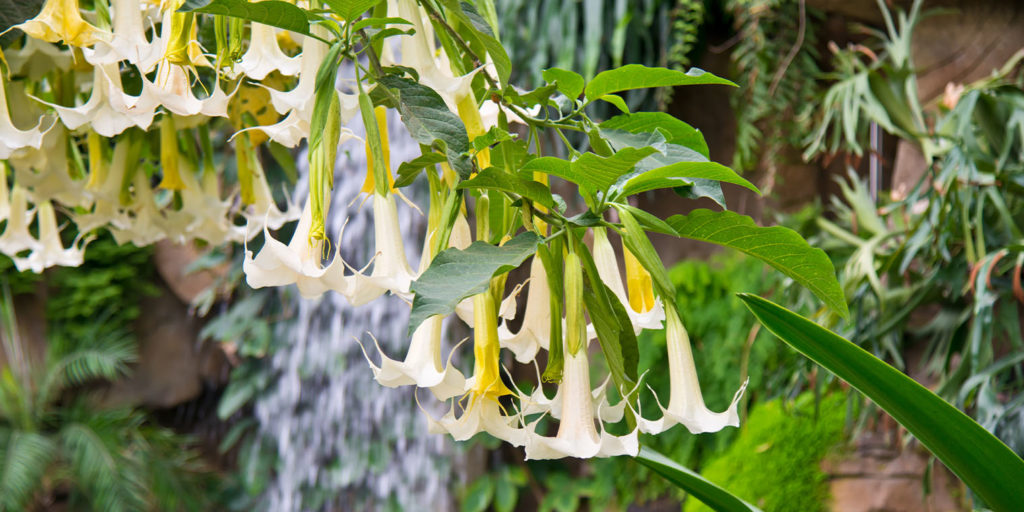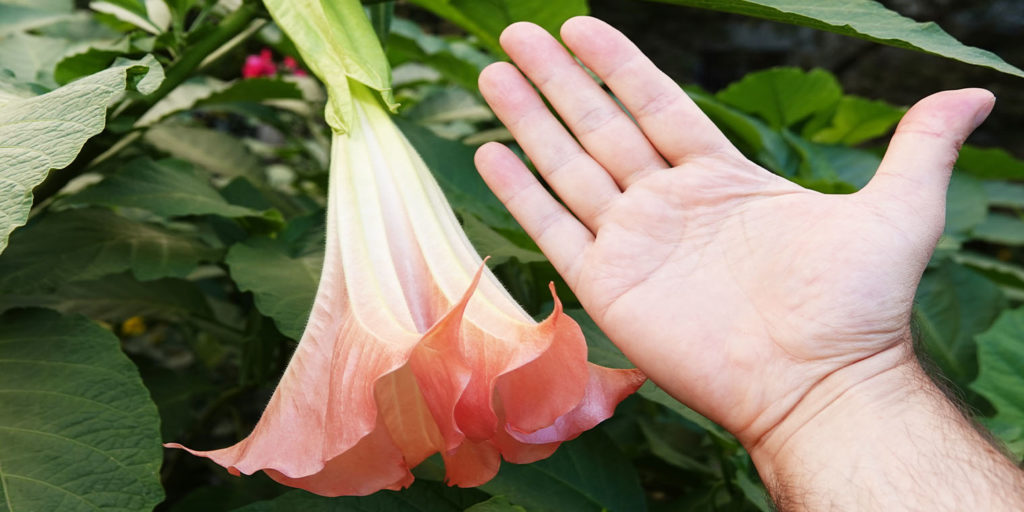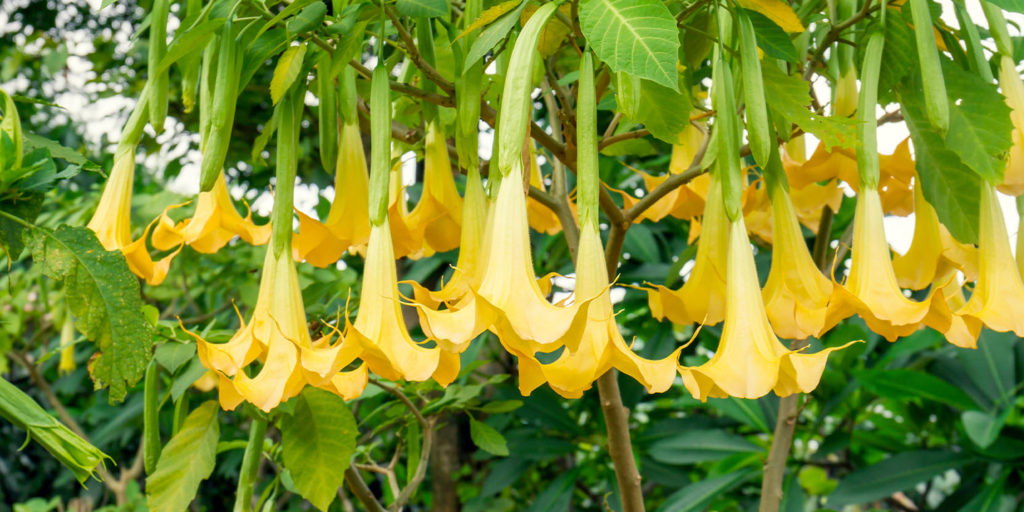The Angel’s Trumpet never fails to impress. Grown as a small ornamental tree or shrub, this distinctive plant has fabulous flared blooms that hang down like the trumpet skirt of a fancy wedding gown! They grow plentifully in clusters, fluttering in the breeze like an ensemble of Flamenco dancers. They can live for several decades with the right care, so they’re certainly a worthwhile addition to your garden. Here’s how to grow and care for them here in Fort Lauderdale!
The angel trumpet plant, also known as brugmansia, is a stunning tropical plant known for its large, fragrant trumpet-shaped flowers. Providing the right fertilizer is key to keeping angel trumpet plants healthy and promoting abundant blooms. In this complete guide, we’ll cover everything you need to know about fertilizing angel trumpet plants.
Angel trumpet plants are woody shrubs or small trees that can grow up to 10 feet tall. They are native to South America but are popular ornamental plants in warm climates worldwide.
The large pendulous flowers come in shades of white, yellow, pink, orange, and red Angel trumpets bloom throughout the warm months, with the peak bloom period in summer. These eye-catching plants have a potent, sweet fragrance that perfumes the garden day and night.
All parts of angel trumpet plants are poisonous, so they must be kept away from children and pets. The flowers especially contain high levels of tropane alkaloids
Why Fertilizer is Important for Angel Trumpets
Fertilizer provides essential nutrients to promote healthy growth and maximize blooms in angel trumpet plants. The three main nutrients plants need are nitrogen, phosphorus, and potassium.
-
Nitrogen stimulates leaf and stem growth and gives plants their green color. It is especially important for foliage growth.
-
Phosphorus helps develop strong root systems and promotes flowering and fruit production.
-
Potassium is key for overall plant health, improving drought tolerance, disease resistance, and cold hardiness.
Without adequate nutrients, angel trumpet plants can experience stunted growth, smaller leaves, and reduced flowering. Their foliage may also turn pale or yellowish rather than a healthy green. Fertilizing ensures plants have all the nutrients they need for optimal growth and performance.
How Often to Fertilize Angel Trumpet Plants
Angel trumpet plants are heavy feeders that benefit from frequent fertilization. Feed angel trumpets every 2-4 weeks during the active growing season.
The goal is to provide a constant supply of nutrients to support new growth flushes and continuous blooming. Stop fertilizing in winter when plants become dormant.
For container-grown angel trumpets, you may need to fertilize more often, like every 2 weeks. Their roots are confined to a small space so nutrients get depleted quicker.
What Type of Fertilizer to Use
Angel trumpet plants thrive with a balanced liquid fertilizer that contains all three macronutrients – nitrogen, phosphorus, and potassium.
Look for a fertilizer with an NPK ratio close to 20-20-20 or 15-15-15. This provides equal amounts of each nutrient. You can also use bloom-boosting fertilizers higher in phosphorus, like 15-30-15, once buds start to form.
Some good fertilizer choices include:
- All-purpose liquid plant foods like Miracle-Gro
- Fish emulsion fertilizers
- Water-soluble tomato fertilizers
- Balanced orchid fertilizers
Avoid quick-release fertilizers which can burn roots if overapplied. Slow-release granular fertilizers are hard to gauge dosage with and release unevenly. Liquid fertilizers are the best choice for angel trumpets.
How to Apply Fertilizer to Angel Trumpet Plants
Always follow label instructions for proper dilution rates when mixing up liquid fertilizer. It’s better to fertilize lightly more often than overload plants with nutrients.
For in-ground angel trumpets, sprinkle the fertilizer around the base of the plant, keeping it away from the main trunk. Water it in well after application.
For container plants, apply the diluted fertilizer solution directly to the soil until it drains from the bottom drainage holes. This ensures nutrients penetrate the entire root zone. Never fertilize a dry soil or it may burn roots.
You can also use a foliar spray, misting diluted fertilizer directly on leaves and stems about once a month. This provides a nutrient boost. Avoid applying foliar sprays in hot, direct sun which can burn leaves.
Signs Your Angel Trumpet Needs More Fertilizer
Watch for these clues your angel trumpet plants are hungry for fertilizer:
- Reduced flowering
- Smaller new leaves
- Yellowing or light green foliage
- Lackluster growth
- Stunted growth
If you notice any of these issues, increase frequency of fertilization. Always monitor soil moisture and water as needed when fertilizing to prevent salt buildup.
With the right fertilizer regimen, your angel trumpet plants will reward you with vigorous growth, glossy green leaves, and spectacular blooms season after season. Pay close attention to their nutritional needs and you’ll be enjoying these tropical beauties at their best.

How Do You Care for Angel’s Trumpet?
Also known as Brugmansia, this versatile plant is Native to South America and is excellent for landscaping planting or container gardens. It’s hardy to USDA zones 9–11, so we can keep it outside all year long in Southern Florida, but folks in cooler climates can overwinter them indoors if they’re in pots. Here’s what you need to know to keep these blooming beauties happy.

While Angel’s Trumpet typically thrives in bright, direct sun, the sunshine in Florida can get pretty intense. You may find you’ll have the best results if you plant Angel’s Trumpet in a spot that gets direct sun in the morning, followed by shade from the intense afternoon sun.
Water your Angel’s Trumpet frequently—you may need to water it every day during the hottest summer months or if it’s grown in a container. Maintain a consistent watering schedule to avoid stressing out your plant and avoid overdoing it with the water. It likes moist conditions, but too much of a good thing can have adverse effects!
This plant thrives in acidic soil, so it’s a good idea to perform a pH test before planting to check out your soil conditions. Mixing in lots of fresh compost and peat moss into the soil will help to acidify the growing conditions.
Angel’s Trumpet prefers moist soil, but it needs to be loose and well-draining to prevent stagnant moisture buildup. That’s a recipe for root rot and fungal growth! Compost and peat moss will also help improve drainage on top of lowering the pH, so you won’t want to skip that step. Spread a layer of mulch across the soil to shield it from the hot sun—this will help slow down the evaporation of water, keeping your plants hydrated longer.

With so many incredible blooms and a lightning-fast growth speed of 2–3 feet per year, it’s no surprise that Angel’s Trumpet is a heavy feeder! You’ll need to fertilize frequently with a water-soluble formula from spring to fall to keep your plant growing steadily. During the first few years of life before they begin blooming, you can use a balanced, all-purpose fertilizer once every week—yes, you read that correctly! Once it begins to approach its blooming phase, you can use a fertilizer with a slightly higher amount of phosphorus—the second number in the NPK ratio—which will help encourage even more of those spectacular flowers to appear.
Pest and Disease Control
There are several plant pests that target Angel’s Trumpet, but luckily, a neem oil solution will work great at killing those mischievous bugs. Stay on the lookout for signs of common pests like aphids, cabbage worms, spider mites, slugs, snails, and mealybugs.
Angel’s Trumpet is vulnerable to Verticillium and Fusarium wilt—incurable viruses that often attack vegetable plants like tomatoes and peppers. They inhibit moisture uptake, which leads to wilting, dehydrated foliage. To slow the spread of these viruses, practice crop rotation, use fresh soil, and always sterilize your containers thoroughly before putting something new inside.

The Best Fertilizers for Angel’s Trumpet
FAQ
What is the best fertilizer for angel trumpets?
Angel’s trumpets are heavy feeders, and a liquid, blossom-boosting fertilizer such as 15-15-15 or 10-50-10 keeps them producing flowers.
What’s the best fertilizer for trumpet vines?
Fertilizer that is high in phosphorus, or even bone meal, may encourage trumpet vine blooming. Pruning at the wrong time can lead to trumpet vine, no blooms.Jul 26, 2021
Can I use Miracle-Gro on Angel Trumpet?
Angel’s trumpet should be fertilized at least once a week. Large plants can be fertilized 2-3 times a week. Do not use slow-release fertilizers since these will not work fast enough. Use a water soluble fertilizer such as Miracle Gro.
What is the best fertilizer for Datura?
Use a balanced fertilizer like a 15-15-15 or a blooming fertilizer like a 7-9-5.
